(Minghui.org) Falun Dafa practitioners in South Korea held press conferences in front of the Chinese Embassy in Seoul and the Chinese Consulates in Busan and Gwangju on April 25, 2025, to commemorate the 26th anniversary of the April 25 appeal. They called for an end to the Chinese Communist Party’s (CCP) persecution of Falun Dafa (also known as Falun Gong).
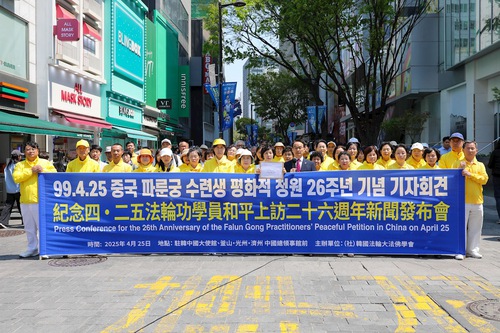
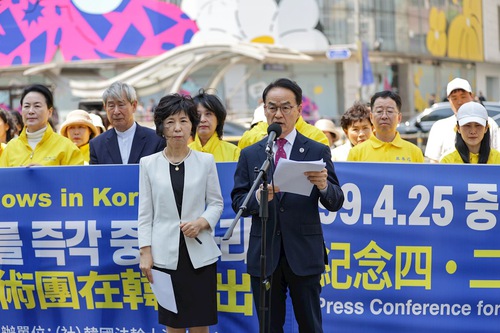 Press conference in front of Chinese Embassy in Seoul on April 25, 2025
Press conference in front of Chinese Embassy in Seoul on April 25, 2025
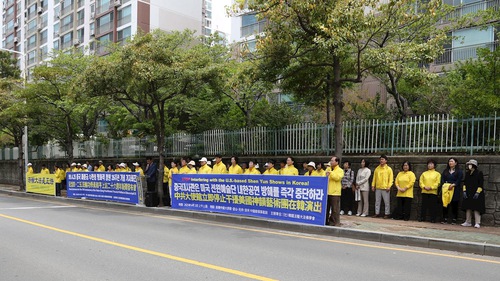 Press conference in front of Chinese Consulate in Busan on April 25, 2025
Press conference in front of Chinese Consulate in Busan on April 25, 2025
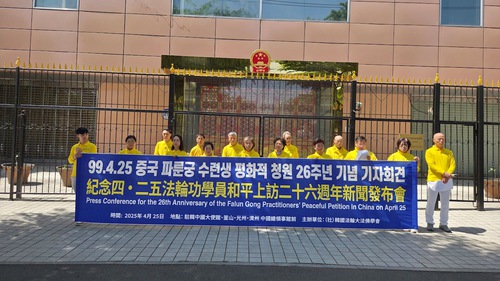 Press conference in front of Chinese Consulate in Gwangju on April 25, 2025
Press conference in front of Chinese Consulate in Gwangju on April 25, 2025
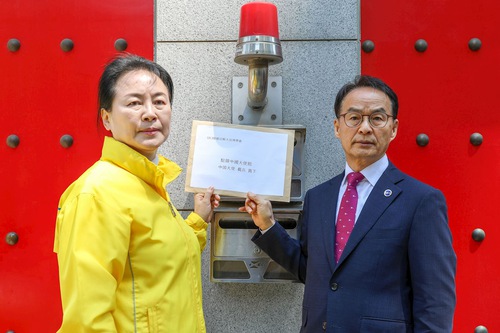 Practitioners deliver the statement from the South Korean Falun Dafa Association to the Chinese Embassy.
Practitioners deliver the statement from the South Korean Falun Dafa Association to the Chinese Embassy.
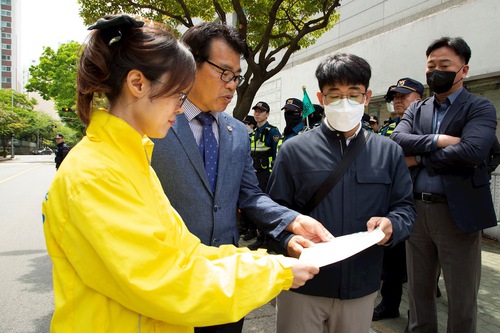 Practitioners deliver the statement from the South Korean Falun Dafa Association to the security guard at the Chinese Consulate in Busan.
Practitioners deliver the statement from the South Korean Falun Dafa Association to the security guard at the Chinese Consulate in Busan.
The South Korean Falun Dafa Association issued a statement during the press conference: “The April 25 petition was a landmark event that demonstrated mature civic consciousness and will become a model for protest in the future.”
Several practitioners recounted the original April 25 appeal during the press conference and condemned the CCP’s persecution. The moderator talked about the CCP’s persecution of Falun Gong practitioners, including the CCP-sanctioned forced organ harvesting of prisoners of conscience. He emphasized, “The CCP’s crimes are unprecedented crimes against humanity.” Local residents and tourists stopped to listen. One resident said, “I thought China and the CCP were the same, but today I know they are not. I support you.” Then he shook hands with the host and expressed his support.
A practitioner recalled that 12 years ago, a former reporter from a South Korean mainstream media who had been stationed in China made a distorted report on the April 25 appeal. The practitioner personally told the reporter the facts and was able to change his mind.
Background: What Is the April 25 Appeal?
Falun Dafa (also known as Falun Gong) was first introduced to the public by Mr. Li Hongzhi in Changchun, China, in 1992. The spiritual discipline is now practiced in over 100 countries worldwide. Millions of people have embraced the teachings—which are based on the principles of Truthfulness, Compassion, Forbearance, as well as five gentle exercises—and experienced improved health and well-being.
On April 23 & 24, 1999, police officials in Tianjin, a city near Beijing, assaulted and arrested dozens of practitioners who had gathered outside a magazine office to discuss errors in an article attacking Falun Dafa. As word spread of the arrests and more practitioners inquired with officials, they were told they had to take their appeals to Beijing.
The following day, April 25, some 10,000 Falun Dafa practitioners spontaneously gathered at the Central Appeals office in Beijing, as they had been instructed by Tianjin officials. The gathering was peaceful and orderly. Several Falun Dafa representatives were called in to meet with Chinese Premier, Zhu Rongji, and members of his staff. That evening, practitioners' concerns were answered. The arrested practitioners in Tianjin were released and everyone went home.
Jiang Zemin, former head of the CCP, perceived the spiritual discipline’s growing popularity as a threat to the CCP’s atheistic ideology and issued an order to ban Falun Dafa on July 20, 1999.
Minghui.org has confirmed the deaths of thousands of practitioners due to the persecution over the years, though due to the difficulty in getting information out of China, the actual number is suspected to be much higher. Many more have been imprisoned and tortured for their faith.
There is concrete evidence that the CCP sanctions the harvesting of organs from detained practitioners, who are murdered to supply the organ transplant industry.
Copyright © 1999-2025 Minghui.org. All rights reserved.
Category: April 25 Events









